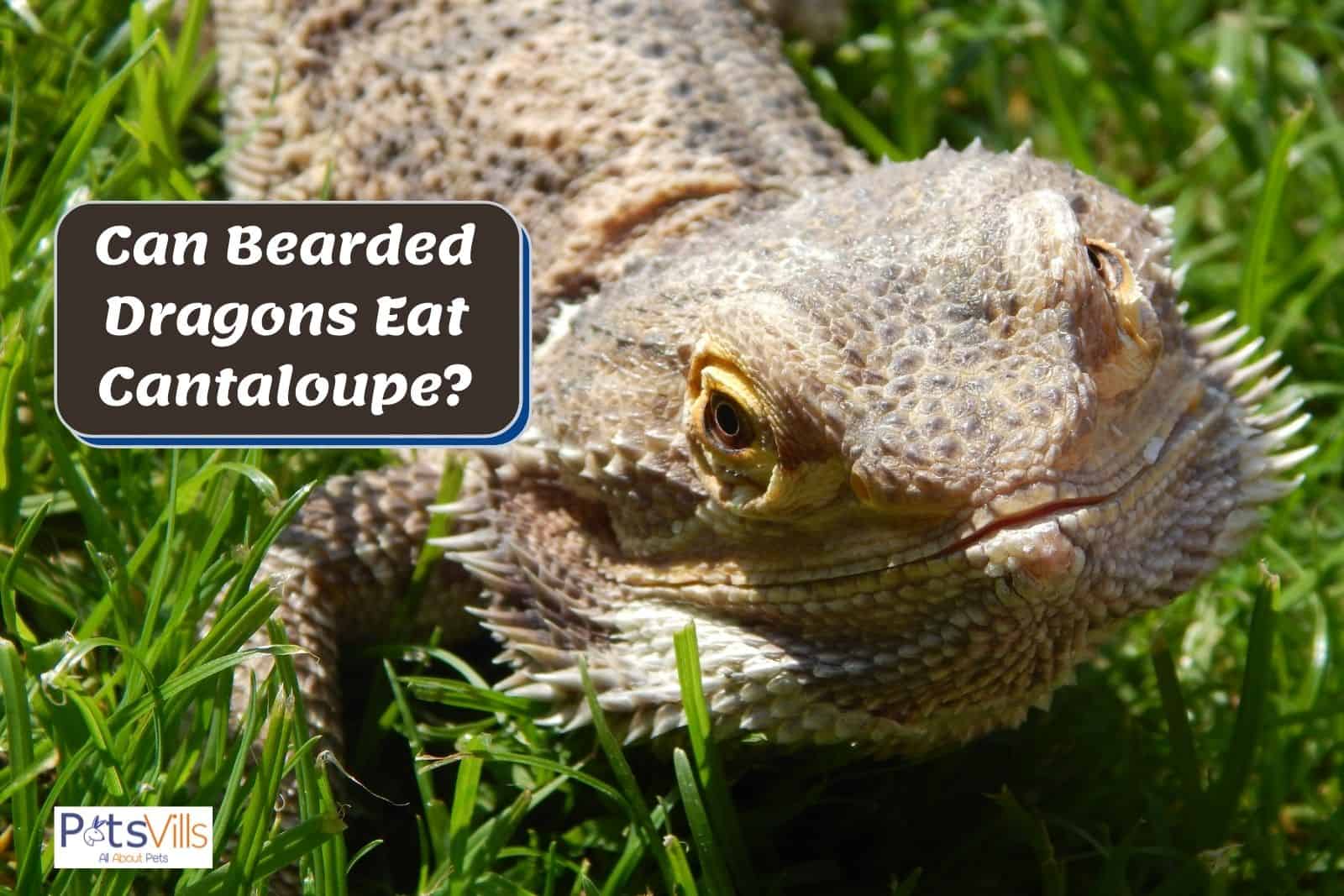Can bearded dragons eat cantaloupe?
All reptiles, in general, have complex nutritional needs, and beardies are no exception.
They can have a wide range of food, making the feeding process easy and fun for the owners.
Let’s find out if cantaloupe is okay to add to their menu!
This post contains affiliate links. We earn a commission if you make a purchase after clicking on our links.
Don’t have time? Check this comparison table of our top faves!
READ MORE: Can Bearded Dragons Eat Kiwi and Other Fruits?
Table of Contents
Can Bearded Dragons Eat Cantaloupe?
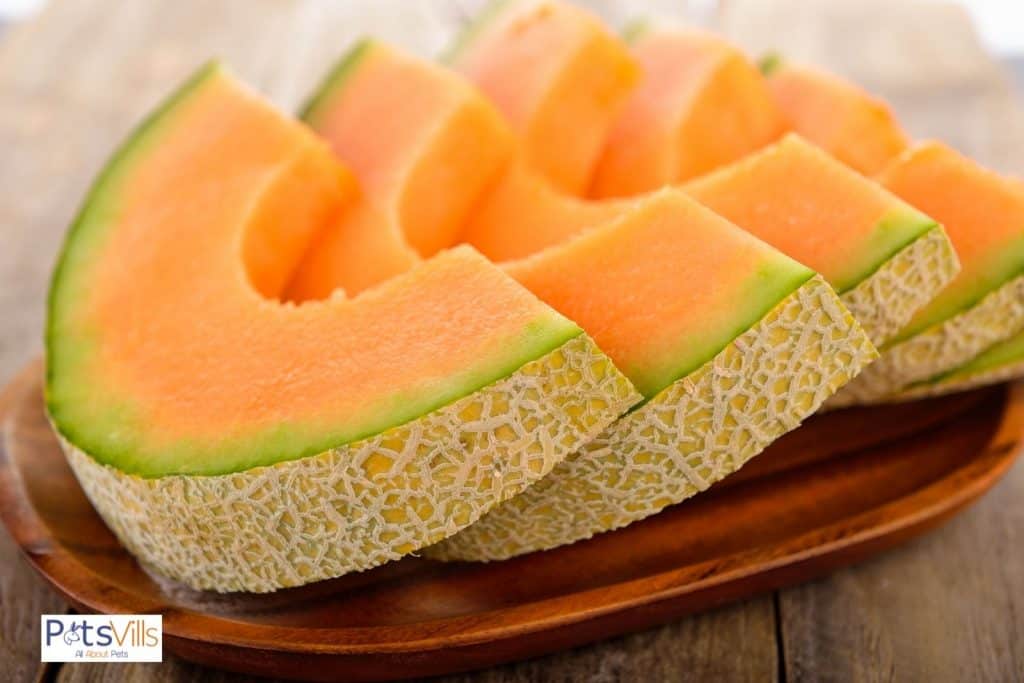
Although cantaloupe is not typically on the menu for beardies, it might appeal to your pet due to the sweet taste of the fruit.
However, just because something is tasty doesn’t mean it’s good, right? So the better question is can bearded dragons safely eat cantaloupe?
The short answer is yes, but only as an occasional treat.
The bulk of your adult beardie’s diet should come from healthier vegetables, low-sugar fruits, and insects.
Can Baby Bearded Dragons Eat Cantaloupe?
While it’s safe to give a baby bearded a small bite of cantaloupe on very rare occasions, overall you should not include this fruit in their diet.
A bearded baby dragon needs to eat insects more than anything as they are still growing and need protein present in the bugs.
According to reptile expert Pete Hawkins, your juvenile dragon should be fed insects five times a week. Typically, they will enjoy small crickets and roaches, as they are stapled foods for dragons.
Bearded baby dragons are also more prone to choking, so make sure to cut the fruit into small bite-size before feeding them.
Look at this cute video:
Health Benefits of Cantaloupe for Bearded Dragons
Cantaloupe does have some health benefits that make it a good choice for a treat compared to some other less-healthy fruits.
Water
Cantaloupe contains 90% water, so it can be an excellent way to keep your dragon hydrated during the hot summers.
Not to mention it is a much tastier way to maintain body fluids than plain old water. Water performs the vital task of helping the various systems in the body to function correctly.
Being adequately hydrated keeps a plethora of diseases away from your pet.
Side note, cucumbers are also a great way to hydrate your dragon. You can even give your bearded dragons cucumber every other week.
Beta Carotene
The bright orange or yellow color of cantaloupe is due to the presence of Beta Carotene. Once consumed, Beta Carotene is converted to Vitamin A or antioxidants, which help fight free radicals.
Vitamin A improves eye health, immune system, and healthy blood cells. Cantaloupe also contains Vitamin C, which helps in fighting illness.
Folate
Folate is the naturally present Vitamin B-9 in foods. Cantaloupe contains folate in good quantity.
Folic acid is the name given to supplements containing Vitamin B-9. It is essential for the skin and tissues of your pet dragon.
Fiber
An essential constituent for proper digestion, fiber is what you get when you eat raw fruits instead of juice. So, cantaloupe also improves the digestion of your dragon.
In addition to digestion, fiber also helps in keeping a reasonable body weight. Bearded dragons in the wild get plenty of exercise, so they don’t get obese.
On the other hand, pet bearded dragons don’t get as much exercise, and thus it becomes vital for their owners to provide fiber to them through their food.
Blueberries, strawberries, grapes, and blackberries can be some other sources of fiber for your dragon. Is it safe to eat wild blackberries? Read this “Can bearded dragons eat blackberries?” guide to find out.
It must be noted not to provide too much fiber, resulting in your dragon having a runny stool.
Potassium
Potassium is a crucial ingredient for heart and muscle health. Cantaloupe has plenty of Potassium. It also improves nerve health and improves muscle movement.
Potassium and sodium are vital electrolytes that help maintain your dragon’s body fluids and blood volume. The carbohydrates present in cantaloupe provide energy.
Other Vitamins and Minerals Present in Cantaloupe
- Vitamin K
- Calcium
- Magnesium
- Zinc
- Copper
- Selenium
- Manganese
Drawbacks of Cantaloupe for Bearded Dragons
Despite all these benefits, why is cantaloupe not advised to be given more frequently to your bearded dragon? There are three chief reasons for that-
Sugar content
Cantaloupe has high sugar content., So, overfeeding it to your bearded dragon could cause obesity.
Dragons in the wild get plenty of exercises, but those in captivity lack exercise and so their sugar content should be monitored.
Water content
Yep, even though this is a benefit, it can also be a drawback. As mentioned above, a cantaloupe contains close to 90% water.
Giving too much of the fruit can actually over hydrate your dragon. Overhydration can cause serious health issues like lack of absorption of nutrients into the bloodstream and diarrhea.
Calcium to Phosphorus ratio
Cantaloupes have a high proportion of phosphorus compared to calcium which essentially means poor calcium absorption.
Poor calcium absorption can be life-threatening for your bearded dragon as it may further lead to metabolic bone disease.
READ MORE: Best Dry Bearded Dragon Food
How Many Cantaloupes Can We Feed Bearded Dragons?
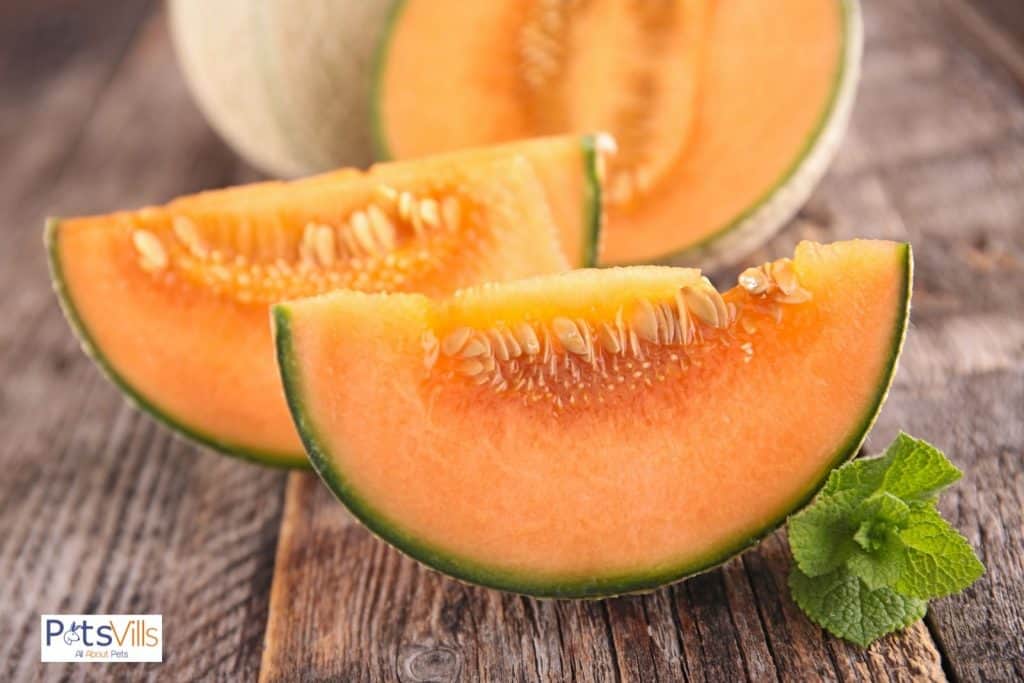
It’s safe to give cantaloupe to your bearded dragon every once in a while.
A single small piece of fruit every other week is more than enough for it.
To help you prepare your beardie’s diet, check our new e-book:
FAQs
How to feed cantaloupe to your beard dragon?
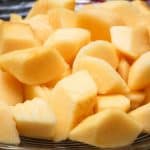
Buy a fresh cantaloupe and wash it well. Washing makes sure no pesticides creep into its digestive system. Cut the fruit into small pieces and remove the seeds. The seeds can be a cause for choking hazards, so removing them is necessary. Now, feed the small slices to your dragon.
What melons can bearded dragons eat?
All melons are safe for your dragon, and hence you can give it watermelon, cantaloupe, honeydew melon.
What fruits should bearded dragons not eat?
While there are many foods that your bearded dragon will like, there are some that you need to keep away from it. Lemons, oranges, and avocados are not suitable for a bearded dragon and should be avoided at any cost.
Conclusion
Your bearded dragon is an omnivore, and like most animals, variety in diet is the key to its good health. They can have cantaloupe as a treat from time to time, but it is essential to provide them with a good mixture of insects and vegetables in their regular diet.
References
- “Bearded Dragons Feeding Guide: Hartley, Alina: 9798537375166: Amazon.com: Books.” 2021. Amazon.com. 2021. https://www.amazon.com/Bearded-Dragons-Feeding-Guide-Hartley/dp/B099BYDM1H.
- McDermott, Annette. 2016. “7 Nutritious Benefits of Eating Cantaloupe.” Healthline. Healthline Media. March 3, 2016. https://www.healthline.com/health/food-nutrition/benefits-of-cantaloupe#betacarotene.
- “What Do Bearded Dragons Eat? The Best Food for Bearded Dragons.” 2021. Exoticdirect. 2021. https://www.exoticdirect.co.uk/news/bearded-dragon-food-advice.
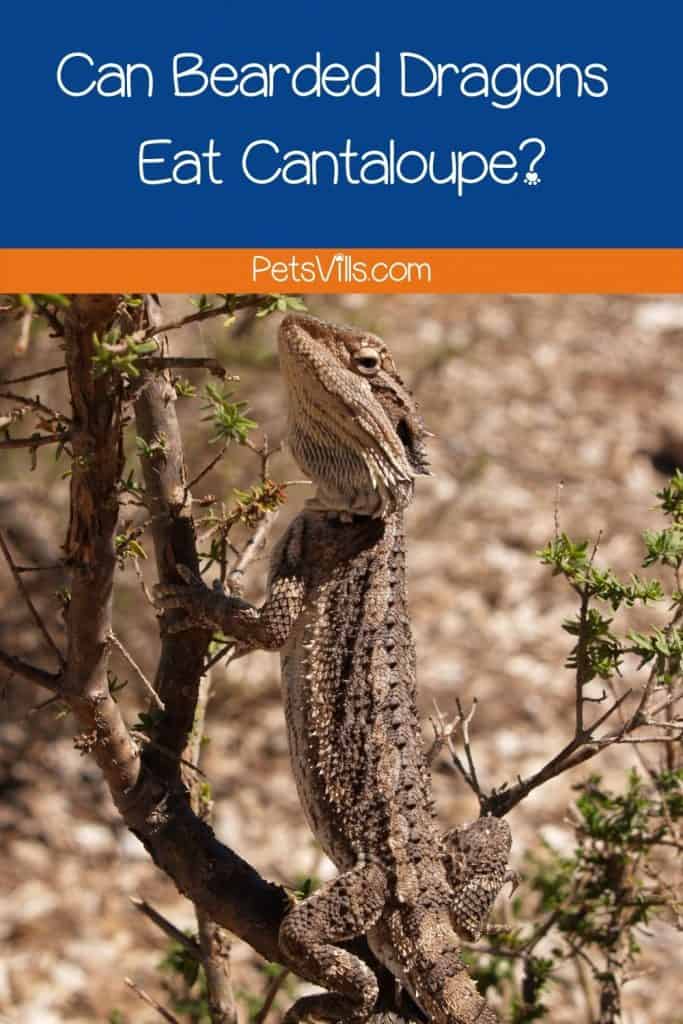
Can bearded dragons eat cantaloupe? What are your thoughts on this topic? Please share with us below!
Barry Stingmore is a British content writer living in Fuerteventura, Spain. An animal lover at heart, he shares his home with a dog and four rescue cats and has a passion for writing about animals big and small.
Barry loves finding answers to your animal-related questions, the more research involved the better! You can rely on him to find the facts.
Find him on FACEBOOK, TWITTER AND Linkedin
Read his latest ARTICLES.
Find more about him HERE.

